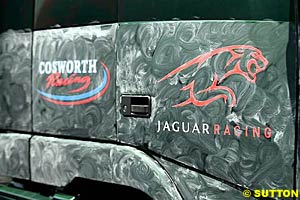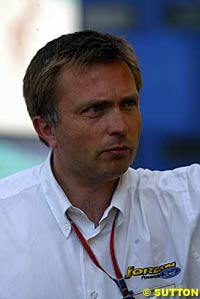Atlas F1 Magazine Writer
Fresh from the Formula One paddock
Eddie Jordan's aspirations of moving his struggling operation to the Middle East, either physically or financially, appear to be over, if, indeed, they ever were more than convenient rumours calculated to create perceived value and black ink at a time when the team's results conspicuously failed to deliver same. Whether Dubai's powerful Al Maktoum family, a branch of which recently financed the building of the country's Grand Prix-compliant circuit, was ever involved in any aspect of the suggested transactions, whether as purchaser or facilitator, is unclear, but, either way, the burning question currently surrounding the yellow operation is not who will own them in the future, but which engines will power them going forward.
Their two-year Cosworth engine deal, rather disingenuously disguised as a 'Ford works' supply to retain the team's then-major asset, Giancarlo Fisichella, who, 'tis rumoured, had a clause in his contract requiring that Jordan be powered via a manufacturer engine partnership, was announced during the 2002 Hungarian Grand Prix. That deal, financed by Ford of Europe in exchange for 'RS' air box branding, expires at season's end, and, considering the criticism the Irishman has hurled at Cosworth in recent times, is unlikely to be renewed. After all, why should Formula One's only supplier of 'affordable' engines continue to take stick that Jordan-Ford are supplied with second-tier engines whilst Jaguar receive the cream of Cosworth's crop.
Jordan and Cosworth, though, may not have much choice in the matter, for a fundamental aspect of Jordan's deal is Ford's $15m/year funding, and, with rumours that Ford of Europe may well be withdrawing from the FIA World Rally Championship come season's end due to financial pressures, it is rather difficult to envisage a scenario where it departs from a series in which it wins on merit (2004 Rally Mexico) - and is presently lying second in both drivers' and manufacturers' standings – whilst continuing with a back marking F1 operation which has scored but five points this season – of which three came after the Williams/Toyota disqualifications in Montreal. Particularly, if, as the Blue Oval said at the time, its deal was aimed at reviving interest in its RS high-performance range...
Questioned at the recent Rallye Deutschland, Jost Capito, Director of Ford Team RS (the company's European performance division), admitted to budgetary considerations, saying that the company's continued involvement in international motorsport was far from certain. "A decision will be taken in mid-September when budgets are finalised," he said, before countering rumours that Ford's rally winner Markko Martin, over whom it has an option for 2005, had signed for Peugeot. "No, it couldn't happen until certain decisions have been taken from our side," commented the German, who prior to joining Ford in 2001, had been Sauber's Chief Operating Officer, and won the truck category on the 1985 Paris – Dakar raid marathon.
So, Jordan go the much-rumoured Toyota engine route for 2005, in exchange for offering the Japanese company's Australian protege Ryan Briscoe, recently promoted to Friday tester, a drive? Seems eminently feasible, solves various considerations and enables Toyota to spread their learning curve (and engine budget) over two teams, and, should the red-white team remain with Michelin, both tyre suppliers. There is little choice for Jordan, particularly as their team boss has been openly critical of the alternatives.
Where, though, would that leave Cosworth financially? Ultimately controlled by Jaguar Racing's team principal Tony Purnell by virtue of both companies being subsidiaries of Ford's Premier Performance Division, both operations have been amortising Jaguar's engine supply over two teams: using Jordan's contribution to, in part, subsidise the other's units. Design, manufacture, logistics and engineering support have been spread over four cars, and Jordan's custom – for which read 'Ford's' – had cut Jaguar's bill by close on 50%. And, unless Cosworth can persuade perennially cash-strapped Minardi, who use its 72-degree, CR-3 V10 but are said to be looking at a Toyota deal, to take and pay for the 90-degree, CR-6 V10 used this year by the Greens and Yellows, PPD is likely to have a major budgetary shortfall. All at a time when Jaguar Racing's continued involvement is under severe scrutiny.
This switches the spotlight neatly onto the future of Jaguar Racing, who lose Mark Webber come 2005. Of course, much has been made of Red Bull's possible purchase of the Leaping Cat, but the Austrian drinks company can be notoriously headstrong (and slow) when it comes to be taking major decisions, as Peter Sauber, who once had Red Bull proprietor Dietrich Mateschitz as shareholder, can testify. And, with the scenario outlined above, yet another consideration faces Red Bull, which entered Formula One with Sauber in 1995: assuming it bought the team, would a guaranteed supply of engines accompany the deal, for Cosworth, which does not confine itself to F1 engine matters, has not (yet) been mentioned in connection with the purchase? And, secondarily, at what price, for Jordan's almost certain defection will impact upon Cosworth's margins.
Another potential punter for Jaguar has recently entered the fray: Christian Horner, better known as boss of the FIA F3000 Championship-winning outfit, Arden, who had hoped the $48m surety bond would, as twice recently suggested by FIA President Max Mosley, be lifted by season's end. With that patently no longer the case, Horner is looking to alternatives. That the ambitious former racer, who did not deny an interest in Jaguar when questioned in Hungary, wishes to move upmarket is well-known; that he has the winning pedigree to deserve it, is obvious. Purchasing Jaguar would solve the bond problem, but, again, engine supply considerations will make or break any possible deal.
All this, though, pre-supposes that Ford really wishes to cut its losses and leave F1. Capito refused to comment on this, stating only that "It's a corporate matter, and the board (in Detroit) will take that decision." Does this apply to all matters Jaguar Racing, whether the team remain in F1; if so, as Jaguar Racing; are sold to, say Mateschitz or Horner; or is, as has been strongly rumoured recently, rebranded as Ford to take on Renault, Honda and Toyota, rather than Ferrari, BMW and Mercedes, in the market place? "Yes. Ford of Europe has no involvement in that at all. It is a corporate matter, and the Detroit board will decide."
Its meetings will have far-reaching consequences: not only will it decide the racing future of an evocative name, but also determine the size and colour make-up of the 2005 Grand Prix grid. And, if Ford's corporate board should decree to end the Oval's direct Formula One involvement, and, in view of recent overall losses it will no doubt take a pragmatic, not emotional, view, will it simply close or sell, and if the latter, to whom? In either case, what would be the future of Cosworth engines, which made their Grand Prix debut (with victory via Jim Clark and Lotus, at that) in 1967, and has won no less than 176 of the 500-odd Grands Prix entered by it - granting Cosworth, at 30%, a better 'strike rate' than Ferrari's 25%.
Let there be no doubt: Ford's decisions over the coming months will have greater impact on the future face of F1 than any number of resolutions made by the Technical Working Group in the same period.

 In fact, BusinessF1 magazine suggests that Cosworth suggested to Eddie Jordan that it would line up, in a press conference, seven crated engines, let the latter select three, ship the balance to Jaguar, and let track results speak for themselves. Allegedly EJ declined the offer, and Cosworth has had no complaints since, but the situation could not have been conducive to constructive negotiations for future supplies...
In fact, BusinessF1 magazine suggests that Cosworth suggested to Eddie Jordan that it would line up, in a press conference, seven crated engines, let the latter select three, ship the balance to Jaguar, and let track results speak for themselves. Allegedly EJ declined the offer, and Cosworth has had no complaints since, but the situation could not have been conducive to constructive negotiations for future supplies...
 Would the 'customer' price, for example, double; would Ford contribute on a 'Jordan' basis; would Cosworth even continue in F1 given that its market could suddenly be cut by up to two-thirds through the defection of Jordan and (possibly) Minardi to elsewhere? There is, of course, a Red Bull/Ford precedent: Sauber was partnered in 1995 by Ford, and the Oval's corporate blue hue is closer to Red Bull's primary colour than Jaguar's green ever was or could be, but, whichever, engine supply must be foremost in any Red Bull/Jaguar sale.
Would the 'customer' price, for example, double; would Ford contribute on a 'Jordan' basis; would Cosworth even continue in F1 given that its market could suddenly be cut by up to two-thirds through the defection of Jordan and (possibly) Minardi to elsewhere? There is, of course, a Red Bull/Ford precedent: Sauber was partnered in 1995 by Ford, and the Oval's corporate blue hue is closer to Red Bull's primary colour than Jaguar's green ever was or could be, but, whichever, engine supply must be foremost in any Red Bull/Jaguar sale.
|
Contact the Author Contact the Editor |
Please Contact Us for permission to republish this or any other material from Atlas F1.
|
Volume 10, Issue 34
Articles
The Long Road
For The Record
Every Other Sunday
2004 Belgian GP Preview
2004 Belgian GP Preview
Belgian GP Facts & Stats
The F1 Trivia Quiz
Columns
On the Road
Elsewhere in Racing
The Weekly Grapevine
> Homepage |
